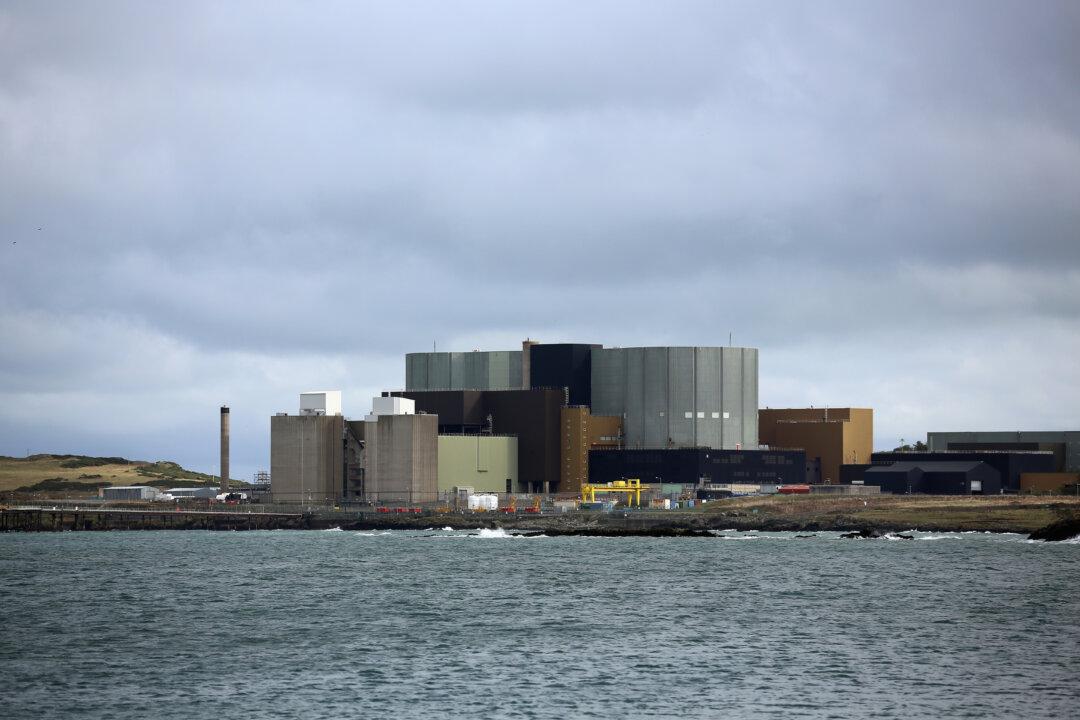The British government selling many of the nation’s assets has struck a nerve with many Brits, especially when it comes to the country’s strategic industries.
But many of those decrying the sell-off of British assets have been chastised and told they are behind the times and a “xenophobe, out of touch with the reality of the modern globalized economy,” according to a 2012 article on the MailOnline.
Inviting in Chinese Companies
United Kingdom’s Chancellor of the Exchequer (Treasury), George Osborne, announced on Oct. 17 that Chinese companies may invest and be involved in the development of British nuclear power.
“Investment from Chinese companies in the U.K. electricity market is welcome, providing they can meet our stringent regulatory and safety requirements,” said Edward Davey, U.K. energy secretary, in a press release.
According to opponents of the deal, a new nuclear plant faces several problems. People are not in favor of nuclear power in general due to the inherent risks and also because communist Chinese regime-owned enterprises are going to be involved in the project.
Additionally, foreign investors will pocket the profits, while the British taxpayer pays for the construction, according to energy expert Dr. Paul Dorman of the University College, London.
Furthermore, “I don’t think any of us can guarantee the future behavior of the Chinese government. Many other countries would refuse a contract like this,” said Chinadialogue.net editor Isabel Hilton.
Not everyone is critical of the nuclear project. Backers of the project state the deal would not only provide clean energy to the British people, but also the cost of building the new plant would come out of foreign investors pockets and not from British taxpayers.
Democratic Control Weakening
Just like anywhere else, there are Brits who say that being a member of the international society, one has to let go of assets, as other countries have to let go of their assets when the Brits buy them. Quid pro quo.
However, it is important that a balance is found where Britain retains power over its own future, said some market consultants.
“The U.K. has sold off considerable amounts of its major industries and assets to overseas owners. This has weakened democratic control of industry, inflated our exchange rate and seriously undermined our manufacturing base,” states a 2013 article on the OurKingdom website.
According to CITY A.M., foreign investors now hold 53.2 percent of all outstanding shares in U.K. companies. In 1998, foreigners held only 30.7 percent of U.K. stocks.
About 50 years ago, individual investors held half of all outstanding shares, while by 2013 only 10.7 percent of U.K. citizens held stock in U.K. companies. Additionally, U.K. pension stock ownership has decreased from 21.7 percent in 1998 to 4.7 percent in 2012, while U.K. insurance companies now hold 6.2 percent, a drastic decrease from the 21.6 percent 14 years ago.
It is not just stock ownership, but patents show the same trend, stated the Mail Online article. Last year, foreign investors held 39 percent of U.K. patents, while in comparison they held only 11.8 percent of U.S. patents.
British Assets Owned by Foreigners
Many British popular brands are no longer held by British nationals.
Among food firms, Branston Pickle, a popular British food firm, was taken over by the Japanese firm Mizkan Group at the end of 2012, according to media reports.
A major loss to Britain was the chocolate maker Cadbury, which is now owned by the American conglomerate Kraft Foods Group Inc. after a hostile takeover, and production was moved to Poland.
The buses boarded at London’s Trafalgar Square are owned by the German company Deutsche Bahn.
Bentley Motors Limited is a wholly owned subsidiary of Volkswagen AG, a German car manufacturer, and the Rolls-Royce is now manufactured by BMW.
The list of former British companies owned by foreign firms is long. Some of the acquisitions were painless, while others brought with them a loss in jobs and tax revenue, as the assets were moved to foreign shores.
The MailOnline article asked, “Is this the price that all nations have to pay for an increasingly globalized world? Not at all—in fact, Britain is unique in having such a supine attitude to selling off its crown jewels.”
UK No. 1 in Europe When It Comes to FDI
Foreign direct investments (FDI) in U.K. assets, such as buying stocks and the buying or holding of patents, continue as long as the U.K. government does not put up barriers.
The U.K. was Europe’s major destination for FDI in 2012 with 697 investments, said a 2013 Ernst & Young report.
When it comes to inbound investments, Ernest & Young predicts the U.K. is one of the most popular FDI countries for Chinese enterprises. However, one has to bear in mind that “the UK’s environment is as alien to most Chinese companies as the Chinese marketplace is to most British companies.”
For the Chinese, the U.K. market’s allure is that they have the opportunity to buy “brands, technological innovation, and know-how,” according to Ernst & Young.
However, Chinese FDI decreased by 13.2 percent in 2012 over 2011, from a total of 144 to 125 investments.
Employment from FDI related activities increased only by 1.4 percent, from 29,688 jobs in 2011 to 30,311 jobs in 2012.
Foreign investors are drawn to the U.K. because it is one of the easiest countries to do business in. However, many British feel that foreign countries do not reciprocate and put up barriers that make it difficult to invest there. However, so far the Brits won’t respond in kind and are keeping an open and friendly investment environment. The U.K. is open for business.




